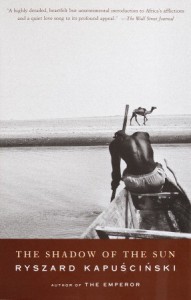 “More than anything, one is struck by the light,” is how Ryszard Kapuscinski begins The Shadow of the Sun: My African Life. “Light everywhere. Brightness everywhere. Everywhere, the sun.” By the end of this unclassifiable book—part journalism, part personal memoir, part travel epic—I felt as if the bright African sun was lodged in my head, turning its truth-telling beams on all my murky, dim, previously held assumptions about Africa.
“More than anything, one is struck by the light,” is how Ryszard Kapuscinski begins The Shadow of the Sun: My African Life. “Light everywhere. Brightness everywhere. Everywhere, the sun.” By the end of this unclassifiable book—part journalism, part personal memoir, part travel epic—I felt as if the bright African sun was lodged in my head, turning its truth-telling beams on all my murky, dim, previously held assumptions about Africa.
Despite all the horror and sorrow of much of what Kapuscinski describes, something about the way he describes it all makes me want to go to Africa immediately. Other continents sound so gray, so predictable, after the riotous brightness of Kapuscinski’s Africa. Where else does the day begin with a sunrise “like a starter’s pistol: the town instantly springs into motion. It’s as if all night long everyone was crouching on his starter blocks and now, at the signal, at that shot of sunlight, they all take off full speed ahead.” Or with “the bell of the coffee seller, who each day at dawn walks up and down the streets of his district… The morning’s first cup is an occasion of greetings and salutations, of mutual assurances that the night passed happily, and of expressions of faith that this promises to be—Allah willing—a good day.”
Who Was Ryszard Kapuscinski?
Kapuscinski was the first correspondent ever sent to Africa by the Polish News Agency. His meager pay meant he could not sequester himself in elegant, post-colonial hotels and neighborhoods and this forced frugality became the secret to his success. He reported on Africa from the street, the bus, the thumbed ride in a creaky truck. He socialized with other correspondents but he used every opportunity that came his way, including spending time in a hospital being treated for malaria, to get to know Africans: not just heads of state but nurses and teachers and bayayes, the underemployed villagers who come from regions ravaged by drought or disease or war and live from one to day to the next on the streets of the cities.
His Polish identity freed him from the biases of his many European colleagues whose national histories included African colonization, or his American and Russian colleagues with their Cold War obsessions. But, he soon learned, his nationality was of little interest to most Africans, to whom he was simply white and therefore privileged.
Kapuscinski Immerses Himself in Africa
What did interest the Africans he met was his willingness to exist in African time, “a much looser concept, more open, elastic, subjective… Time appears as a result of our actions, and vanishes when we neglect or ignore it.” Kapuscinski’s bare bones modus operandi—one man, one notebook—and his lack of an expense account and the deadline pressure to go with it meant he could spend days hitchhiking across the Sahara or into the forests of Cameroon. It meant he could take the time to travel to the Ugandan village of a city friend: only 50 miles from Kampala but deep in the “lush, riotously overgrown, endlessly germinating, multiplying and seething” jungle. He sleeps on a mat on the floor and helps the children of the household fetch water in the morning “from a small, barely moving stream, overgrown with burdock and bulrushes.” He eats boiled green bananas for breakfast: a luxury reserved for guests in a village where one meal a day is the norm; one every two days during the dry season. It is from these vividly painted details that we begin to see the Africa not visible from the balconies of ex-pat hotels and compounds; the Africa of a closely observant writer.
But Kapuscinski was also there for nearly every declaration of independence and the decades of coups that followed. He does not flinch from violence; he looks for the street-level viewpoint: “A puddle of blood has congealed on the marble floor at the entrance. A bloodied djellabah is still lying next to it.” He writes about war in Eritrea, the massacres in Rwanda, the endless, violent coups in Liberia and the rise to power in Uganda of Idi Amin, a barely literate bayaye recruited off the streets by an army officer who was impressed by his “Herculean physique.”
The book’s final essay, “In the Shade of a Tree, in Africa,” is written as a kind of fable, a distillation of visits to hundreds of villages, as if what Kapuscinski most wants us to remember are not the dates and names that go with all the wars and coups but the transcendent essence of Africa: where a lone mango tree is a village gathering place, a symbol of constancy—and yet also a reminder of just how precarious life is, every day, for nearly everybody, as they search for, above all else, “shade and water, two fluid, inconstant things which appear and then vanish, who knows where.”
And then, the daily search over, comes the dark nightly wait for “Africa’s most dazzling moment… the break of day.” Which is where Kapuscinski leaves us: with the promise of another dawn.
If this review made you want to read the book, pick up a copy of The Shadow of the Sun from Bookshop.org. Your purchase keeps indie booksellers in business.
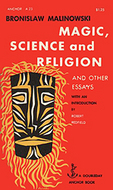 A random reference in another book led me to finally pull this tattered paperback from my to-read shelf. I have a cultural bias toward Poles and though I had no real idea what this book was about, I was in.
A random reference in another book led me to finally pull this tattered paperback from my to-read shelf. I have a cultural bias toward Poles and though I had no real idea what this book was about, I was in.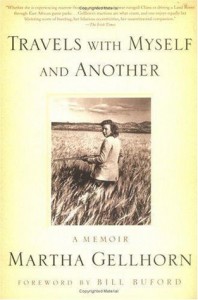 Ann Hedreen turned me on to Martha Gellhorn in a
Ann Hedreen turned me on to Martha Gellhorn in a 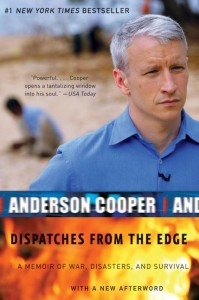 The highlight of this nonfiction binge was definitely Anderson Cooper’s Dispatches from the Edge. Cooper found a way to marry a straightforward reportage of some pretty horrific war and devastation with a frank look at the trauma of his own life. For the majority of the book, he keeps his own emotion out of the narrative. He paints the scenes in enough detail that the reader can easily interpret and react to the facts on their own. This book hit exactly the right tone.
The highlight of this nonfiction binge was definitely Anderson Cooper’s Dispatches from the Edge. Cooper found a way to marry a straightforward reportage of some pretty horrific war and devastation with a frank look at the trauma of his own life. For the majority of the book, he keeps his own emotion out of the narrative. He paints the scenes in enough detail that the reader can easily interpret and react to the facts on their own. This book hit exactly the right tone.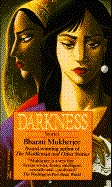 In a rapidly globalizing world, we are all moving away from our ancestral homelands. As an American, I have too many ancestral homelands to even choose between them, which I think means I cannon truly understand what a homeland is. Bharati Mukherjee captures beautifully the feeling of displacement in her story collection, Darkness.
In a rapidly globalizing world, we are all moving away from our ancestral homelands. As an American, I have too many ancestral homelands to even choose between them, which I think means I cannon truly understand what a homeland is. Bharati Mukherjee captures beautifully the feeling of displacement in her story collection, Darkness.